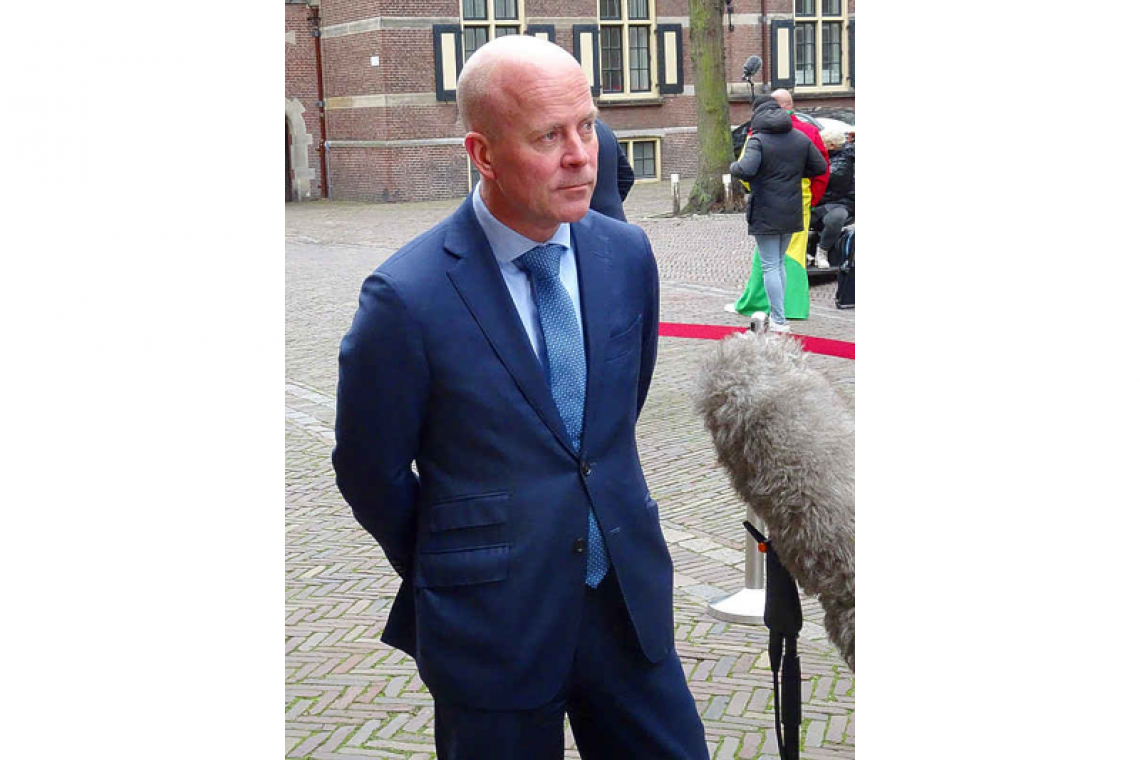State Secretary of Home Affairs and Kingdom Relations Raymond Knops (File photo by Suzanne Koelega)
THE HAGUE--The Dutch government has invested some US $2 million in the process to improve financial management in Bonaire, St. Eustatius and Saba, State Secretary of Home Affairs and Kingdom Relations Raymond Knops informed the Dutch Parliament on Monday.
In a letter to the Second Chamber, Knops provided an overview of financial management in the three public entities, which are part of the Netherlands. Financial management are not up to par as yet in Bonaire and Statia. In Saba, on the other hand, financial management has been in order in the past years.
The public entity Saba has been able to keep its financial management structurally at an adequate level, and as such no plan of approach had to be drafted, contrary to Bonaire and Statia for which plans have been drawn up.
Financial management has been a source of concern in Bonaire, stated Knops. This was confirmed by the fact that the accountant did not issue a positive audit report with the 2019 annual report. The Dutch government has made US $482,500 available to strengthen Bonaire’s Finance Department and to carry out the plan of approach.
Since the start of the trajectory in 2018 to improve financial management, insufficient progress has been made in Bonaire, despite the agreements that were made and the support that was offered from the Netherlands to execute this task, the state secretary noted.
During his visit to Bonaire on August 31, Knops reminded the local government of the agreements and the necessity to work on better financial management. “I have asked the Executive Council more decisive, concrete action in this area. In times of crisis, I also expect the public entity to give content to the agreements that we have made.”
For Statia, a maximum of about US $801,000 has been allocated for the execution of the 2018 improvement plan financial management. It mainly concerns specific internal control, the collection of tax arrears and a reorganisation of the creditors’ administration. These areas, as well as the actualisation and implementation of procedures for the granting of subsidies to foundations, still need to be worked on.
Even though in 2019, a large backlog in financial administration was cleared, there are several areas in financial management where insufficient progress has been made as a result of the lack of local financial expertise and higher-qualified personnel.
The Netherlands is providing temporary financial capacity where necessary for the vacancies that are hard to fill. External expertise is also hired from financial service providers in the Caribbean region.
The annual reports of 2017 and 2018 of the public entity St. Eustatius were only submitted in October and November this year. The annual reports did not receive an unqualified statement of approval of the external accountant. The 2019 annual report should be ready late February 2021.
“Despite the number of realised improvements in financial management, such as the digitalisation of the financial administration, a continuous challenge for the public entity St. Eustatius to implement the necessary actions and to include these in a structural manner within the organisation, mainly due to the lack of expertise on the island,” stated Knops.
During his visit to Saba on November 4 and 5, the state secretary signed off on a special allowance of US $728,000 for Saba’s financial management structure. Even though Saba has its financial household in order, the tenability of the budget and the financial position of the public entity Saba has been qualified as a risk.
A second risk that was identified by the accountant and the Committee for Financial Supervision CFT is the pension regulation for (former) elected officials. Saba can hardly cover the financial impact of this regulation. In November, Saba was unable for the first time since 2010 to present a balanced budget due to increased operational costs and the lack of structural funding from The Hague.
“Even though Saba has a solid financial management, I have special attention for Saba’s financial situation, and I am taking the signals of the accountant, the CFT and the Island Council, and the concerns expressed by the Executive Council to heart,” stated Knops.
For this reason, the state secretary added, he made the financial contribution in question available which enables Saba to implement the recommendations of the accountant which are needed for structural solid financial management.
As for the financial management of the countries Aruba, Curaçao and St. Maarten, Knops noted that this remained a priority and that improvement was necessary. He mentioned the concerns expressed by various institutions of the countries, such as the external accountant SOAB, the Councils of Advice, the General Audit Chambers and the CFT/CAFT.
These institutions in the past years have pointed out the need for solid, balanced budget policy and improvements in the budgetary and financial management. “Unfortunately, this has not or insufficiently resulted in improvements. This makes the countries insufficiently resilient against financial setbacks and there is much insecurity about the trustworthiness of the governments’ financial household,” stated Knops.
The improving of financial management is a vital aspect in the country packages for Aruba and Curaçao which will be implemented in the coming years along with structural reforms in return for liquidity support from the Dutch government. No agreement has been reached with St. Maarten as yet.







